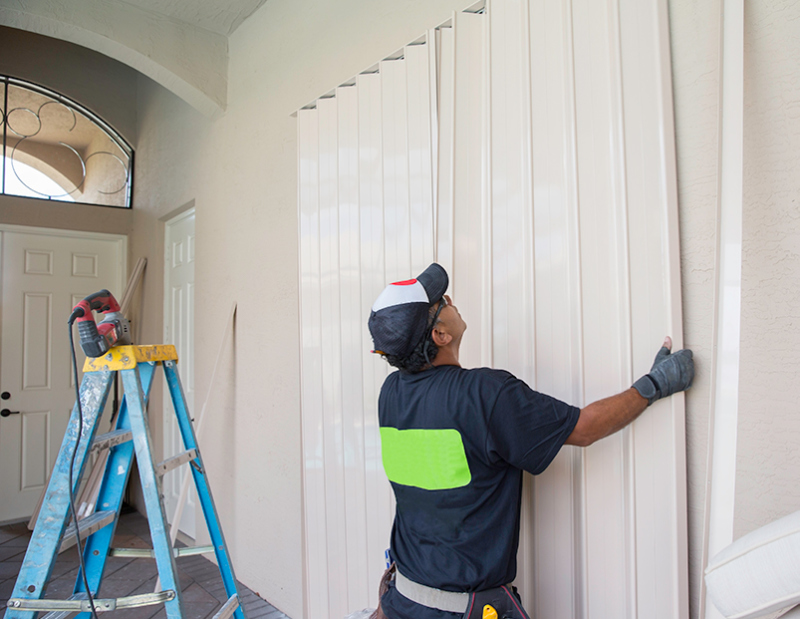
Hurricane season can result in devastating loss. It is important to prepare for the possibility of a hurricane or other disaster to minimize potential impacts on your home and family. When a powerful storm is bearing down, it may be too late to protect your property.
The Atlantic hurricane season officially runs from June 1 through Nov. 30 every year. Threats include:
- High winds
- Heavy rainfall
- Storm surge
- Coastal and inland flooding
- Rip currents
- Tornadoes
Powerful hurricane winds can damage or destroy homes, buildings, roads, and cause utility outages.
Coastal flooding triggered by hurricanes is as destructive as wind and can be even more deadly. Hurricanes produce widespread torrential rains that can trigger landslides and debris flow. Flash flooding can occur quickly due to intense rainfall over a relatively short period of time.
Prepare a Survival Kit
You can build your supplies over time by adding items gradually; it does not need to happen all at once. You will want to stock the items you need both during the storm itself and in the immediate aftermath.
Keep track of your inventory, including expiration dates of things like batteries and nonperishable foods, and refresh supplies as needed. The recommended emergency kit includes:
- Water: 1 galloon per person, per day (3-day supply for evacuation; 2-week supply for home)
- Food: Nonperishable, easy-to-prepare items (3-day supply for evacuation; 2-week supply for home)
- Manual can opener
- Flashlight
- Battery-powered or hand-cranked radio (NOAA Weather Radio if possible)
- Extra Batteries
- Family-size-first-aid kit
- Medications (at least 7-day supply)
- Medical items: Hearing aids, glasses, contact lenses, syringes, etc.
- Multipurpose tool
- Sanitation and personal hygiene items
- Copies of important documents: Seal them in a watertight container to keep them safe. Keep the originals and other documents elsewhere – with a trusted person who lives in a different area, in a bank safe deposit box or in secure cloud storage.
- Cell phone and charger
- Family and emergency contact information
- Extra cash
- Emergency blanket: choose one that is waterproof, windproof, easily packable, and won’t shred.
- Map(s) of the area
- Extra set of car keys and house keys
- Pet supplies
Plan for Evacuation
Be prepared to evacuate and do so immediately when the order is issued. Know your route, your destination, and make sure you have a full tank of fuel. Get the information on official area shelter locations from your local government or the Red Cross. They can also tell you what you are and are not allowed to bring (including pets). If you plan to leave the area, check the news for information on road closings and traffic jams. Keep a detailed road map in your car in case you are not able to access route guidance online due to lost signal.
Protect Your Assets
It is a good idea to take a detailed inventory of all your belongings and update it annually. Supplement it with photos and videos, if you can, and keep at least one copy in a safe place away from your home; cloud storage is ideal. Putting this list together may seem like a tedious task, but it will greatly simplify any post-hurricane insurance claims you need to make.
Here are some tips to prepare your home for a hurricane:
- Shutters: Install shutters on all windows. The Insurance Institute for Business & Home Safety recommends using plywood as a last resort.
- Doors: FEMA recommends closing all interior doors in addition to all windows and exterior doors, to reduce damage risks. According to IBHS, closing interior doors reduces pressure on the roof during a storm, which gives it a better chance of staying intact.
- Trees: Cut weak or damaged tree branches, along with branches that could snap in high winds and damage property below them.
- Seals: Seal off small openings and gaps with silicone caulk to avoid leaks.
As the storm moves closer, follow this last minute hurricane season preparedness checklist:
- Place all appliances that are on the ground floor, including stove, washer, and dryer, on masonry blocks or concrete.
- Lift furniture and electronic devices off the floor. This is particularly crucial for items in basements and on the first floor.
- Remove area rugs from floors so they will not get wet and grow mold or mildew.
- Put fresh batteries in sump pumps.
- If you have an emergency generator, make sure it is fueled up, and keep spare fuel on hand in a safe location.
- Shut off electrical service at the main breaker if the electrical system and outlets could possibly end up underwater.
Flood Insurance Coverage
Your homeowners’ policy does not cover flood damage. Flood insurance is administered through the federal government. Therefore, homeowners can purchase flood policies from an insurer under contract with the Federal Emergency Management Agency (FEMA) or through private insurance policies. There is generally a 30-day waiting period before a flood insurance policy takes effect.
Protect Your Home and Your Family
Richland-Knowles Insurance Agency is here to help you protect your home and your family. One of the most important ways to prepare for a hurricane season is to meet with your insurance professional. We are ready to review your insurance coverages so that you and your family do not have to worry when the next hurricane arrives. Give us a call at 908-273-7100 or email us at Information@RichlandKnowles.com if you have any questions.
